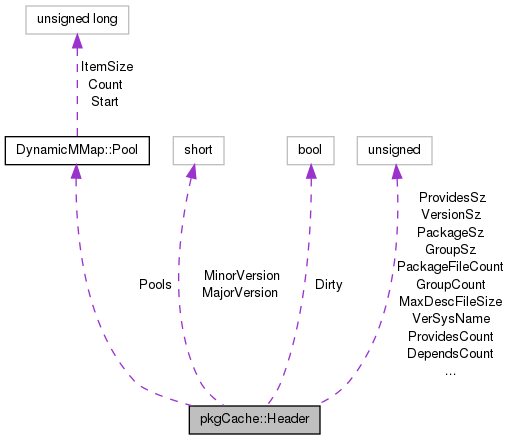#include <pkgcache.h>
| pkgCache::Header::Header |
( |
| ) |
|
| bool pkgCache::Header::CheckSizes |
( |
Header & |
Against | ) |
const |
| unsigned long pkgCache::Header::CacheFileSize |
Size of the complete cache file.
| unsigned short pkgCache::Header::DependencySz |
| unsigned long pkgCache::Header::DependsCount |
| unsigned long pkgCache::Header::DescFileCount |
| unsigned short pkgCache::Header::DescFileSz |
| unsigned long pkgCache::Header::DescriptionCount |
| unsigned short pkgCache::Header::DescriptionSz |
| bool pkgCache::Header::Dirty |
indicates if the cache should be erased
Dirty is true if the cache file was opened for reading, the client expects to have written things to it and have not fully synced it. The file should be erased and rebuilt if it is true.
| unsigned long pkgCache::Header::GroupCount |
Structure counts.
These indicate the number of each structure contained in the cache. PackageCount is especially useful for generating user state structures. See Package::Id for more info.
| unsigned short pkgCache::Header::GroupSz |
| map_ptrloc pkgCache::Header::GrpHashTable[2 *1048] |
| unsigned short pkgCache::Header::HeaderSz |
Size of structure values.
All *Sz variables contains the sizeof() that particular structure. It is used as an extra consistency check on the structure of the file.
If any of the size values do not exactly match what the client expects then the client should refuse the load the file.
| short pkgCache::Header::MajorVersion |
These contain the version of the cache file.
| unsigned long pkgCache::Header::MaxDescFileSize |
The maximum size of a raw entry from the original Translation file.
| unsigned long pkgCache::Header::MaxVerFileSize |
The maximum size of a raw entry from the original Package file.
| short pkgCache::Header::MinorVersion |
| unsigned long pkgCache::Header::PackageCount |
| unsigned long pkgCache::Header::PackageFileCount |
| unsigned short pkgCache::Header::PackageFileSz |
| unsigned short pkgCache::Header::PackageSz |
| map_ptrloc pkgCache::Header::PkgHashTable[2 *1048] |
hash tables providing rapid group/package name lookup
Each group/package name is inserted into the hash table using pkgCache::Hash(const &string) By iterating over each entry in the hash table it is possible to iterate over the entire list of packages. Hash Collisions are handled with a singly linked list of packages based at the hash item. The linked list contains only packages that match the hashing function. In the PkgHashTable is it possible that multiple packages have the same name - these packages are stored as a sequence in the list.
Beware: The Hashmethod assumes that the hash table sizes are equal
The Pool structures manage the allocation pools that the generator uses.
Start indicates the first byte of the pool, Count is the number of objects remaining in the pool and ItemSize is the structure size (alignment factor) of the pool. An ItemSize of 0 indicates the pool is empty. There should be the same number of pools as there are structure types. The generator stores this information so future additions can make use of any unused pool blocks.
| unsigned long pkgCache::Header::ProvidesCount |
| unsigned short pkgCache::Header::ProvidesSz |
| unsigned long pkgCache::Header::Signature |
Signature information.
This must contain the hex value 0x98FE76DC which is designed to verify that the system loading the image has the same byte order and byte size as the system saving the image
index of the first StringItem structure
The cache contains a list of all the unique strings (StringItems). The parser reads this list into memory so it can match strings against it.
| unsigned long pkgCache::Header::VerFileCount |
| unsigned short pkgCache::Header::VerFileSz |
| unsigned long pkgCache::Header::VersionCount |
| unsigned short pkgCache::Header::VersionSz |
String representing the version system used.
The documentation for this struct was generated from the following file:
